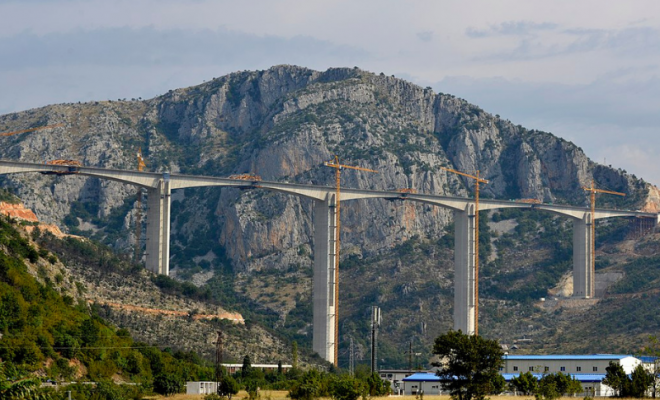Montenegro risks losing part of its territory to the initiative of China, which Malta has also joined

[ad_1]
Following a series of scandals in Montenegro, linked to Chinese state-owned companies and the Maltese government, the small state of the Western Balkans may soon find its land seized by a bank run by the Chinese Communist government, with no hope of outside help.
The European Union has refused to help the candidate country repay a billion dollar loan borrowed from ExIm Bank in China for an unfinished highway project.
EU spokesperson Peter Stano mentionned that the EU is already the largest provider of financial assistance and the largest trading partner, but is not responsible for the loans the country has taken out. “We continue to support them, but we do not repay the loans they take out from third parties,” Euractiv reported.
The loan was taken out in 2014 and the bank was expected to finance 85% of the construction of the new road. The first loan repayment is due in July and the default gives the bank the right to seize part of Montenegro’s land as collateral.
The 165 km highway cuts through impossible terrain and remains unfinished as loan funding has run out and Montenegro’s pockets are empty.
The situation has led the government to be forced to take a number of fiscal measures to increase public revenue. This included the application of a 21% tax rate on non-tourism activities in 2018, the partial freeze of public sector wages and the end of state benefits to mothers.
The loan exacerbated Montenegro’s debt problem, bringing the debt ratio to 65.9% of GDP. The change of government after the 30-year reign of the Democratic Socialist Party in 2020 left the new leaders in an impossible situation.
The bank financed a number of projects As part of the One Belt, One Road initiative, Malta was one of the first EU countries to join in 2018.
Typically, it grants loans at very low or no interest rate to a developing country, usually for infrastructure projects. This approach has been called “debt trap diplomacy” by critics. Other countries including Pakistan, Sri Lanka and Djibouti also have have accepted large loan offers as part of the initiative and are now having difficulty meeting their repayment obligations.
In these cases, the consequences are the same: the territory and control are transferred to the bank.
When the Maltese government announced the country’s participation, the deal was described as “An initiative to bring together different agreements. He signals to Chinese companies that for the Chinese government Malta is a good country to invest in regarding EU regulations â€.
The deal only became public after it was signed and has since been deleted from the Information Department website.
In Montenegro, this is just the latest in a series of suspicious and corrupt deals costing taxpayers dearly.
Montenegro has signed with Henley and Partners to offer its passport for sale, flying on the tails of a possible future EU membership. It has signed an agreement with Shanghai Overseas Chinese Exit-Entry Services (the same as Malta) to offer them exclusivity to act as an intermediary with Chinese clients looking for a new citizenship.
They also teamed up with Vitals Global Healthcare with the plan to replicate the scam which saw Maltese taxpayers lose hundreds of millions of euros thanks to a concession granting three public hospitals to a private company with no healthcare experience. For now, plans appear to have stalled due to the change of government, but there is no doubt that if it comes to fruition it would be disastrous for the country’s already fragile health system.
Enemalta, the partially Chinese Maltese energy company has invested in the Mozura Wind Farm Project in Montenegro. Enemalta bought Mozura shares for 10.3 million euros from a Seychellois company in 2015. Barely two weeks earlier, this company had bought them for 2.9 million euros from a Spanish consortium which had the concession for operate the wind farm.
The new government said it would investigate the deal for alleged corruption and embezzlement, a call echoes by the European Commission.
[ad_2]
